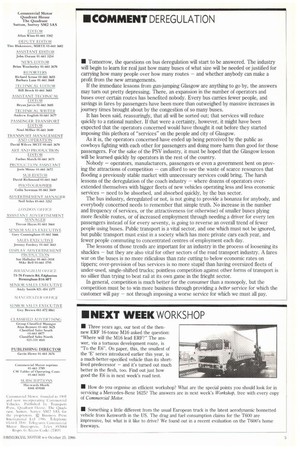• Tomorrow, the questions on bus deregulation will start to
Page 5

If you've noticed an error in this article please click here to report it so we can fix it.
be answered. The industry will begin to learn for real just how many buses of what size will be needed or justified for carrying how many people over how many routes — and whether anybody can make a profit from the new arrangements.
If the immediate lessons from gun-jumping Glasgow are anything to go by, the answers may turn out pretty depressing. There, an expansion in the number of operators and buses over certain routes has benefited nobody. Every bus carries fewer people, and savings in fares by passengers have been more than outweighed by massive increases in journey times brought about by the congestion of so many buses.
It has been said, reassuringly, that all will be sorted out; that services will reduce quickly to a rational number. If that were a certainty, however, it might have been expected that the operators concerned would have thought it out before they started imposing this plethora of "services" on the people and city of Glasgow.
As it is, the operators concerned have ended up being perceived by the public as cowboys fighting with each other for passengers and doing more harm than good for those passengers. For the sake of the PSV industry, it must be hoped that the Glasgow lesson will be learned quickly by operators in the rest of the country.
Nobody — operators, manufacturers, passengers or even a government bent on proving the attractions of competition — can afford to see the waste of scarce resources that flooding a previously stable market with unnecessary services could bring. The harsh lessons of the deregulation of the coach industry — where dozens of operators overextended themselves with bigger fleets of new vehicles operating less and less economic services — need to be absorbed, and absorbed quickly, by the bus sector.
The bus industry, deregulated or not, is not going to provide a bonanza for anybody, and everybody concerned needs to remember that simple truth. No increase in the number and frequency of services, or the attractiveness (or otherwise) of smaller buses plying more flexible routes, or of increased employment through needing a driver for every ten passengers instead of for every seventy, is going to reverse an overall trend of fewer people using buses. Public transport is a vital sector, and one which must not be ignored, but public transport must exist in a society which has more private cars each year, and fewer people commuting to concentrated centres of employment each day.
The lessons of those trends are important for an industry in the process of loosening its shackles — but they are also vital for other sectors of the road transport industry. A fares war on the buses is no more ridiculous than rate cutting to below economic rates on tippers; over-provision of bus services is no more stupid than having oversized fleets of under-used, single-shifted trucks; pointless competition against other forms of transport is no sillier than trying to beat rail at its own game in the frieght sector.
In general, competition is much better for the consumer than a monopoly, but the competition must be to win more business through providing a better service for which the customer will pay — not through imposing a worse service for which we must all pay,




































































































































